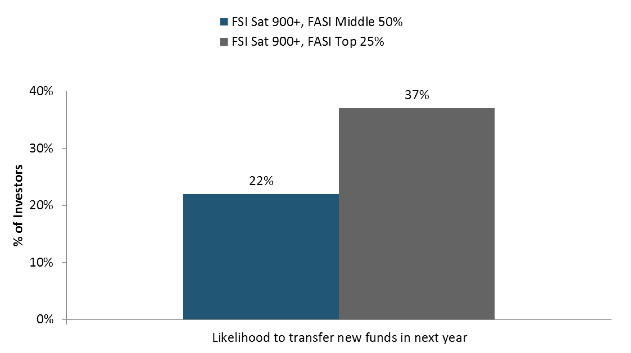Strengthening Advisor Relationship Skills
In collaboration with Applied Psychoanalytics, drawing on extensive research into the key elements underpinning a strong patient-therapist relationship, J.D. Power has developed the Financial Advisor Strength Index, a tool that measures the strength of the investor-advisor relationship. The index model identifies five elements that characterize the optimal relationship:
Respect: Do advisors create an environment where investors perceive that their ideas, time, and relationships are taken seriously?
Mutual Navigation: Do investors help set their own investment agenda? Do advisors tailor their communication to effectively reach their clients?
Alignment: Are advisors and investors on the same page? Are approaches to clarification and confrontation effective?
Teamwork: Do advisors take turns asking questions? Do advisors listen? Are investors at the center of the relationship?
Durability: Is the relationship elastic and agile enough to endure the market’s rough times and advisor mistakes?
J.D. Power tested the validity of the model by re-contacting a sample of the respondents who participated in the 2013 Full Service Investor Satisfaction Study and asking them to complete a battery of questions related to the above. J.D. Power then analyzed the responses from the second survey and compared these satisfaction and business outcome findings with those from the 2013 Full Service Investor Satisfaction Study.
The most striking finding of the analysis is that even when satisfaction levels and KPI performance are similar—such as high financial advisor scores and strong relationship skills among advisors—business outcomes are significantly better when the Financial Advisor Satisfaction Index is higher.

Recommendations For Firms To Improve Relationship Skills Among Their Financial Advisors
- Focus on advisors, as they are responsible for more than 50 percent of the drivers of investment satisfaction.
- Continue to measure and manage advisor performance, which requires understanding the drivers of how and accurately measuring advisor effectiveness in those areas.
- Ensure advisors are performing the KPIs that lead to high levels of satisfaction -- in short, developing a sound financial plan with investors and establishing and maintaining strong lines of communication.
- Make sure advisors are doing the right things in the right way to develop a strong relationship with investors, which is characterized by credibility and trust and fosters the sense of partnership and collaboration investors want.
- Measure the current strength of the relationship with tools that capture the critical elements of relationship building: respect, mutual navigation, alignment, teamwork, and durability.
- Training, which historically has been centered on the technical parts of the job -- investment theory, product, and compliance -- needs to focus on improving relationship skills, as those will make the difference between winning and losing in the battle for money in motion.
Rockwell Clancy is vice president of financial services at J.D. Power. He oversees the company’s syndicated studies, proprietary research, consulting and performance improvement programs for consumer financial services.








